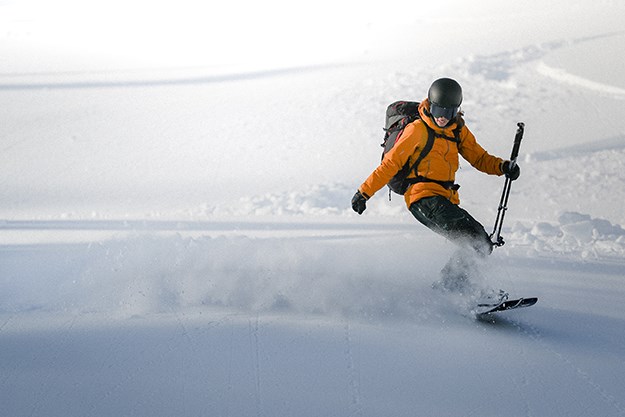After more than a decade of planning, training and testing, Squamish's Christine Feleki achieved her
She did it her way, too, becoming the first woman to complete the process using a splitboard, which can come in handy in the backcountry, giving her the option to ski or board depending on the situation.
Growing up in Canmore, Feleki has always felt at home in the mountains. She's enjoyed the active aspects of jobs like serving, but needed to take it a step further and is appreciative of the opportunity to work with people in the backcountry.
"I love to be outside. I'm not very good at doing an office job or even an indoor job," said Feleki, who currently teaches and guides for Altus Mountain Guides and Extremely Canadian in ski touring, heli-touring and heli-skiing. "What I really like about guiding is the shared experience that you get to have with people. So, even if you are in the same place over and over again, you're with these different people and you get to see it [through] their eyes.
"They're overcoming something or learning something new for the first time and it makes it exciting in that way."
Feleki was inspired by snowboarding pioneers like the late Craig Kelly and Scott Newsome, the latter of whom passed his exam on a snowboard and inspired her to pursue guiding in around 2009.
"I totally switched gears from being a snow bum in Whistler for years before that and decided I would start pursuing that," she said.
From there, Feleki attended Thompson Rivers University to take adventure guiding purely to pursue her passion, but observed that the students were predominantly men.
"I didn't set out to be the first [woman]. It just kind of happened that that was the case when I started," she said.
Soon, Feleki began building her resume of personal and industry experience to submit to the ACMG. After achieving some other prerequisites, needing two tries to pass her apprenticeship, she completed the ACMG's four-week course covering everything from alpine skills, ski-touring skills and mechanized skiing to technical skills like rope rescue, companion rescue and ski/snowboard ability.
Next, Feleki was recommended for the final exam, which she was originally scheduled to take in the spring of 2020, but it was postponed due to COVID-19. Feleki had a couple years off between the course and the final exam to prepare, including recovering from injuries, but was glad to challenge it with two separate sections in December and January, with some pandemic modifications.
Firstly, the challengers went with only one examiner at a time. As well, the tests were held between Squamish and the Duffey, including excursions in the Callaghan and off of Whistler Blackcomb, rather than running on terrain that's further afield.
Feleki acknowledged that she guides all over and the Sea to Sky isn't necessarily the region she knows best.
"There were places on my exams I'd never toured to," she said. "In the start of January, we were still dealing with lots of stormy weather, short days, limited access, and some interesting snow layers.
"It wasn't easy just because I was near home."
After completing the long process, Feleki had some temptation to downplay the achievement, reasoning that people regularly pass these exams. On the other hand, she recognizes all that went into it.
"If you don't stop and pause and look at your success, you'll just blow by it," she said. "I'm trying not to do that.
"I've been working at it for quite a long time and it feels good to pass and be done with it."
Now that it's behind her, Feleki is eager to have time for other parts of her life again.
"Not everyday needs to be a training day now, so maybe I'll just learn to knit or something," she said.
"Probably not," she added with a laugh. "I'm still out on my days off, but there's not so much pressure to be performing every single day."



